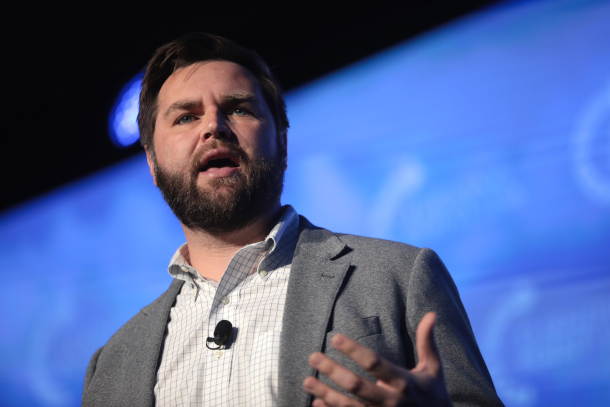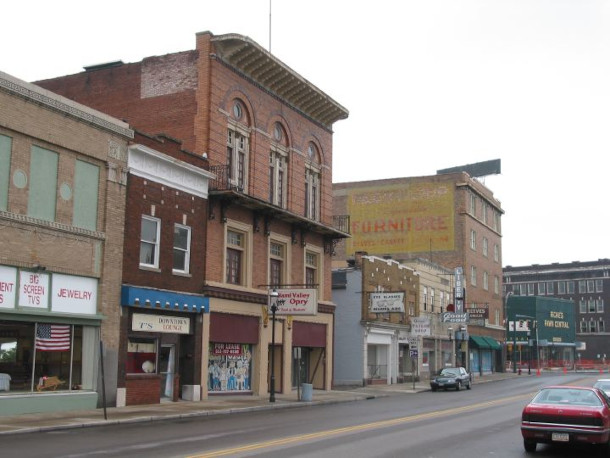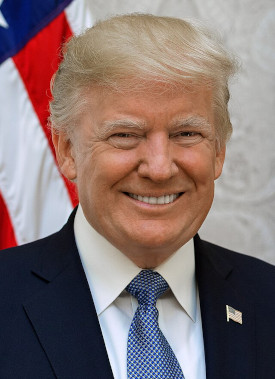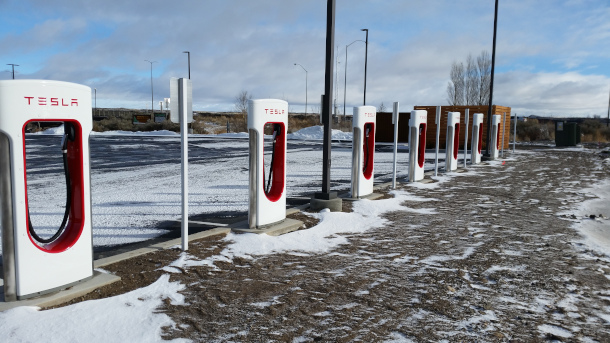The Transformation of J. D. Vance
Air Date: Week of July 19, 2024

Former President Trump picked Ohio Senator JD Vance to be his running mate in November’s presidential election. (Photo: Gage Skidmore, Flickr, CC BY-SA 2.0)
J. D.VANCE : Donald Trump’s running mate, Ohio Senator J. D. Vance, once held moderate Republican stances on climate and clean energy. But he now echoes Trump on the “Green New Scam” and unleashing domestic fossil fuels. Ohio-based Inside Climate News Reporter Dan Gearino joins Hosts Steve Curwood and Jenni Doering to contrast the J. D. Vance of a few years ago with that of today.
Transcript
DOERING: And I’m Jenni Doering.
The 2024 US presidential election has already been tumultuous but, Steve, in some respects it’s just beginning.
[RNC HALL SFX]
And at the Republican National Convention in Milwaukee, Wisconsin, the party coalesced around presidential nominee Donald Trump, his chosen running mate J. D. Vance and the GOP platform.
Representative Michael Waltz from Florida, who Co-Chaired the party platform committee spoke on the first night.
WALTZ: We will unleash American energy and flood the world with clean, cheap American oil and gas -- Drill Baby Drill! [CHEERS]
And, Jenni, in his nomination acceptance speech, J. D. Vance put the focus squarely on American energy and manufacturing jobs.
[CROWD CHANTS, "J.D.! J.D.! J.D.!"]
VANCE: But, my fellow Americans, here in this stage and watching at home, this moment is not about me. It’s about all of us, and it’s about who we’re fighting for. It’s about the auto worker in Michigan wondering why out-of-touch politicians are destroying their jobs. It’s about the factory worker in Wisconsin who makes things with their hands and is proud of American craftsmanship. It’s about the energy worker in Pennsylvania and Ohio who doesn’t understand why Joe Biden is willing to buy energy from tin-pot dictators from across the world, when he can buy it from his own citizens right here in our own country.
And of course, the Senator from Ohio always brought it back to the former President.
VANCE: A leader who rejects Joe Biden and Kamala Harris’ ‘Green New Scam’, and fights to bring back our great American factories, we need President Donald J. Trump. [CHEERS]
DOERING: Steve as you know with just two years in the US senate J. D. Vance doesn’t have much of a record in politics.
But neither did Donald Trump when he came down the escalator of Trump Tower in 2015 to announce his candidacy.
CURWOOD: Right, so joining us now to help unpack what we do know about J. D. Vance when it comes to climate and environment is Dan Gearino, an Inside Climate News reporter based in Columbus, Ohio.
Hey Dan, welcome back to Living on Earth!
GEARINO: Great to be here.
CURWOOD: So, Dan, how would you describe the J. D. Vance we've seen in recent days?
GEARINO: The J. D. Vance we've seen in recent days is this version of him that came into life with his Senate campaign, which is just not that long ago, and is a lot different from the J.D. Vance we saw just a couple years before that, when he was this author of a best selling memoir, who was had a lot more of a kind of moderate republican image. One of the most interesting things about J. D. Vance is the extent of the transformation of kind of the way he talks about issues and even kind of specific stances on some issues related to energy and the environment.

Vance made a name for himself in 2016 as author of the memoir, Hillbilly Elegy: A Memoir of a Family and Culture in Crisis. (Photo: college.library, Flickr, CC BY 2.0)
DOERING: Now, in his speech, Vance highlighted his roots in Middletown, Ohio. What's Middletown like?
GEARINO: Middletown has a steel plant that's been around for a long time and has long been the kind of core of the local economy, but it used to have a lot more industry. Middletown was probably a really nice place to live circa 1950, maybe a little bit later than that. And like so many cities of its size, it lost a lot of industry over, you know, the 1980s, 1990s. And it had a lot of poverty. It is a town that has struggled a lot and so much of what is a through line in J. D. Vance’s memoir, and a lot of what seems to have helped to form his worldview is some of the factors that led to Middletown kind of falling from its position of economic prosperity to one of real economic desperation.
CURWOOD: You know, Dan, it may be apocryphal, but supposedly CBS Radio picked Middletown, Ohio as the, quote, "American Voice" as they started to broadcast around the country. And of course, the book he wrote is called Hillbilly Elegy. So how much of a hillbilly was he there in Middletown? I guess, being raised by his grandmother, Mamaw. How does that background help Mr. Trump? Oh, and by the way, unlike probably your typical hillbilly he married the daughter of Indian immigrants.
GEARINO: This question you ask gets kind of to the core of his identity. And this is one of the most controversial aspects of how people look at and will at times criticize J. D. Vance. So first of all, Middletown is not in Appalachia. J. D. Vance comes from his family history is definitely in Appalachia, family in Kentucky, but he grew up in a part of the industrial Midwest that I don't think there's any map of Appalachia that would include Middletown. And the idea of the term hillbilly is one that is fraught for sure. There are a lot of people who are from Appalachia, who look at the way he talks about Appalachia, from his background, not being from Appalachia, and they really didn't like it. And this is something you would see across the political spectrum, but particularly Democrats and people kind of the middle of the road politically. They would basically say this is kind of a caricature of our region that is being kind of spoon fed to people who are not from the region and don't necessarily recognize it. So yeah, it's you could spend all day kind of dissecting his identity, his kind of family history and identity, it clearly forms a lot of how he views the world. He talks about Appalachia and talks about this place that he's from.
CURWOOD: And he certainly doesn't sound like Eastern Kentucky.
GEARINO: No.

Vance grew up in Middletown, Ohio, in the industrial midwest. (Photo: Sherm Cohen, Flickr, CC BY-NC 2.0)
DOERING: Now, as you mentioned, Dan, there's been a lot of talk about how J. D. Vance has gone through quite a transformation on Trump over the years. I mean, he once called Trump America's Hitler described him as really dangerous but now he's of course a fierce supporter and defender of the former president, what changed?
GEARINO: It will be interesting. I mean, in long hindsight, at some point in the future, to be able to figure out the precise point that J. D. Vance seemed to just turn on a dime in terms of the way he talks about things and his whole kind of aura as a public figure, but from our vantage point right now, I think it's pretty clear that that Senate race, the Senate race, he ultimately won because he had Trump's endorsement. It was a very crowded race. He was not leading in the polling, by adopting a Trump like tone and by very skillfully getting Trump's endorsement in a field in which there were a bunch of other candidates that wanted Trump's endorsement, desperately wanted it, he got it. And what he did was took this kind of persona that he had before as this public intellectual, this guy who wrote about Appalachia with his kind of the distance of almost an academic. A real smart guy, a guy who came from finance, a guy who went to Yale Law School, who had a part time faculty position at Ohio State briefly after he moved back to Ohio. That person was out the door. You didn't hear from him anymore. You heard this kind of very aggressive way of talking about immigrants. This real lack of nuance when so much of what defined him before was a whole bunch of nuance. I mean, one of the reasons that Hillbilly Elegy was widely read and widely liked, I would say across the political spectrum in a lot of ways, I mean, there were certainly detractors, but it was something that got a lot of respect from a lot of quarters, was that he did seem to possess some nuance when talking about what ails the industrial Midwest and talking about the solutions, and it was not this straight up partisan view. That changed dramatically, and it was around the time that he was a Senate candidate or about to become Senate candidate you also can look at when he got the beard. You look at the videos of the kind of public intellectual phase of J. D. Vance's life after returning to Ohio, you know, when you see him without the beard, you're probably gonna get the kind of the nuanced, the caveats, just a really a different guy. A lot of times if you're just watching video, and when you see the beard, you know, you're gonna get the kind of the post Trump J. D. Vance. And it's just striking.

Senator Vance has criticized former President Trump a number of times in the past but has voted in alignment for most of his Senate career. (Photo: Official White House Photo by Shealah Craighead, Wikimedia Commons, Public Domain)
CURWOOD: Yeah, and so let's play a clip of J. D. Vance. Speaking back in 2020 at Ohio State University. There was an event on the American dream before he aligned himself so closely with Trump,
VANCE: We of course, have a climate problem in our, in our society, one largely caused now by unrestrained emissions in China. Part of the reason we have that problem is because we're not generating energy much cleaner than we used to 30 or 40 years ago. And in fact, the biggest improvement in emissions is solar energy, which can provide a substantial amount of our power but can't provide anything like 50% of our power, definitely not 100% of our power, and through sort of, you know, our increasing reliance on natural gas, which, of course, is an improvement over dirtier forms of power, but isn't exactly the sort of thing that's going to take us to a clean energy future.
CURWOOD: What's your takeaway from the way he was talking about energy and climate back then it certainly wasn't drill, baby drill.
GEARINO: No and it wasn't especially partisan. I would say that the way he was talking about these issues back then, are like somebody who has just a basic understanding of the facts about climate change, and about the global energy economy. I mean, you could almost say that like a high schooler or even a middle schooler who has basic understanding, you know, this is a lot of common sense stuff. And what's striking is how, in hindsight, it was notable that he was making statements that are verifiable facts. It's like, oh, my goodness, what a contrast, when in fact, what he was saying it was very much a mainstream view. It was even within the Republican Party, you could be an elected Republican and say exactly what he said, and you wouldn't necessarily get into trouble. It's a different person than the one we've got now or at least a fundamentally different way of talking about these things. The guy we hear in that clip is someone who would barely recognize the guy that we heard speak at the Republican Convention.
DOERING: So Dan, as we heard, at the top of this segment, Vance mentioned, quote "the auto worker in Michigan wondering why out of touch politicians are destroying their jobs". Now that sounded like it must be a reference to the electric vehicle manufacturing incentives in the inflation Reduction Act, but the Biden administration has been creating jobs through electric vehicle incentives. So why is Vance adopting this rhetoric?

Investments in electric cars, Vance argues, will threaten auto workers’ livelihoods. (Photo: cifraser1, Flickr, CC BY 2.0)
GEARINO: There is this sense in parts of the Republican Party, that this is something that will catch on with voters or has caught on with voters. It's also very much in line with what fossil fuel industries would like to see, they want to see this demonization of electric vehicles. And it's almost completely contrary to the facts of what's actually happening. The shift to electric vehicles is something that would lead to a net gain in jobs in auto jobs. And in union jobs definitely in Ohio. I mean, you can look at billions of dollars of investment in Ohio, you can look at investment in Michigan. What does shift to EV does is it creates a lot of anxiety for auto workers, because these jobs are changing, it creates kind of fertile ground if you want to kind of sow discord and make workers skeptical about this shift toward cleaner transportation. But it's just striking how contrary that is to the idea of making the US competitive in the auto economy that we're gonna have 10 years from now, 20 years from now, 30 years from now. It's almost like a strategy that has an expiration date of the November election. And maybe that's all that's needed. But um, it's one of those things when you think back to what kind of the public intellectual J. D. Vance of a couple years ago, he never would believe that he you know, it's like he would debate himself right here and say "come on, you know, let's be real here". So yeah, that is something that I also found striking when I heard that.
CURWOOD: Well thank you so much, Dan, for taking this time with us today and sharing your insights. J. D. Vance, from your own state there in Ohio. Dan Gearino is an Inside Climate News reporter based in Columbus, Ohio. We'll talk to you again soon sometime in the future, I suspect.
GEARINO: All right. Thank you very much.
Links
Watch JD Vance’s Speech at the Republican National Convention
Living on Earth wants to hear from you!
Living on Earth
62 Calef Highway, Suite 212
Lee, NH 03861
Telephone: 617-287-4121
E-mail: comments@loe.org
Newsletter [Click here]
Donate to Living on Earth!
Living on Earth is an independent media program and relies entirely on contributions from listeners and institutions supporting public service. Please donate now to preserve an independent environmental voice.
NewsletterLiving on Earth offers a weekly delivery of the show's rundown to your mailbox. Sign up for our newsletter today!
 Sailors For The Sea: Be the change you want to sea.
Sailors For The Sea: Be the change you want to sea.
 The Grantham Foundation for the Protection of the Environment: Committed to protecting and improving the health of the global environment.
The Grantham Foundation for the Protection of the Environment: Committed to protecting and improving the health of the global environment.
 Contribute to Living on Earth and receive, as our gift to you, an archival print of one of Mark Seth Lender's extraordinary wildlife photographs. Follow the link to see Mark's current collection of photographs.
Contribute to Living on Earth and receive, as our gift to you, an archival print of one of Mark Seth Lender's extraordinary wildlife photographs. Follow the link to see Mark's current collection of photographs.
 Buy a signed copy of Mark Seth Lender's book Smeagull the Seagull & support Living on Earth
Buy a signed copy of Mark Seth Lender's book Smeagull the Seagull & support Living on Earth

